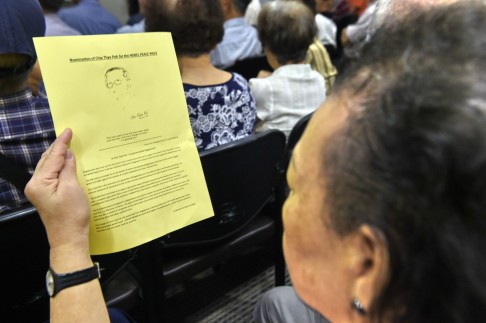The Nobel committee traditionally doesn’t reveal the names of the nominees.
However, there was growing speculation that this 12 months’s award – which will probably be announced on October 9 – might be awarded to German Chancellor Angela Merkel for her leadership during Europe’s refugee crisis.
Chia, 74, was arrested for anti-government activities in 1966 under the ruling People’s Action Party (PAP) led by Lee, who jailed political opponents during his 31-year rule ending in 1990.
Chia spent 23 years under the Internal Security Act (ISA), which allows for detention without trial, and media reports say most of his detention took place in solitary confinement.
Former physics teacher Chia was fired in 1989 and placed under house arrest on the island of Sentosa off the mainland for an additional nine years until all restrictions imposed on him were lifted in 1998.
Activists note that Chia’s 32 years in prison were longer than the 27 years in prison of Nelson Mandela, former president of South Africa and winner of the Nobel Peace Prize in 1993.
Lee, who died in March this 12 months on the age of 91, accused Chia and other dissidents of being communists attempting to overthrow the federal government.

Chia, who has never faced any charges, was not present on the announcement of his nomination.
In his memoirs, Lee described Chia as a “determined man of stubborn, if mistaken, beliefs” who didn’t hand over even after the autumn of communism around the globe.
“His detention, despite pressure from the Western media, discouraged other communist cadres from achieving their goals under the guise of exercising their democratic rights. They were formidable opponents. We had to demonstrate decisiveness and tenacity in this battle of wills,” Lee wrote.
Activists say the nomination is full of symbolism.
Chia “has been a source of inspiration over the years to those who have chosen the difficult path of advocating for political and other freedoms in Singapore – a path still fraught with difficulties and challenges,” university professor Gomez said in his nomination letter.
Tan Jee Say, the opposition politician who first raised the idea of the nomination, said he hoped it would shed fresh light on a chapter in Singapore’s history that he felt had been left out of the national narrative.
“We look forward to the day when a balanced history is written about our past, and we hope that the nomination of Dr. Chia Thye Poh for the Nobel Peace Prize will pave the way,” he said.










